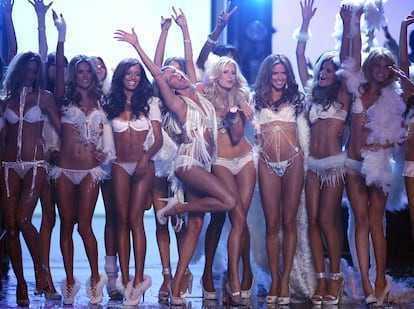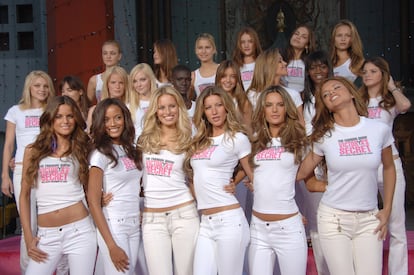A dictatorship of perfection and misogyny: a look into Victoria’s Secret’s angels and demons
An upcoming three-part documentary details the rise and fall of the lingerie empire that launched the careers of models like Gisele Bündchen and Adriana Lima

For the lingerie brand Victoria’s Secret, once the head of an empire, the past decade has been turbulent. Gone are the golden days when the world stood still to watch the brand’s annual show. Its carefully chosen models, the so-called angels, represented a beauty standard unattainable to most women, and they paraded the runway in glittering wings and minuscule diamond-cut lingerie.
The shows, which lasted for 23 years, were considered the Super Bowl of fashion. They featured performances by pop singers including Lady Gaga, Bruno Mars, The Weeknd, Taylor Swift and Beyoncé. Until its last edition, held in Paris in 2018, the event represented the fantasy that Victoria’s Secret marketed. It launched the careers of models Gisele Bündchen, Adriana Lima, Heidi Klum and Alessandra Ambrossio, among others.
The women showed off almost superhuman physiques, sculpted through rigorous training and starved in the days leading up to the parade. But the brand’s image no longer has a place in a #MeToo-era society, now more willing to champion body positive, diversity and inclusivity and to denounce sexual harassment and the hypersexualization of women’s bodies.

The new three-part documentary series The Rise and Fall of Victoria’s Secret explores the brand’s shadows. The production, which premiered on June 18 at the Tribeca Film Festival, combines first-hand accounts with deep investigation to reveal the brand’s inner workings. “Truth is not what it seems, as the underworld of fashion, the billionaire class, and Jeffrey Epstein are revealed to all be inextricably intertwined with the fall of this legendary brand,” reads the summary of the miniseries, directed by Peter Berg and Matt Tyrnauer. It will be available to stream on Hulu starting July 14.
A culture of misogyny and the descent to hell
The film promises to uncover the lingerie empire’s links with sexual predator Jeffrey Epstein. A 2019 New York Times investigation revealed that in the 1990s, a financial adviser close to Leslie H. Wexner, executive director of the company L Brands—Victoria’s Secret parent company—worked as a model recruiter for the brand in exchange for sexual favors. This adviser would later be found to be Epstein, a millionaire accused of sex trafficking who later commited suicide in jail while awaiting trial. Subsequently, Wexner has repeatedly claimed to feel “ashamed” by his friendly relationship with the pedophile.
But Victoria’s Secret’s fall in popularity came before this scandal. In 2018, the company lost almost 50% of its value. That same year, which marked the last parade, the show reached the lowest audience in its history since its start in 1995: 3.3 million viewers compared to the usual 10 million.
That year, the company’s marketing director, Ed Razek, made clear his opposition to gender diversity in an interview with Vogue. “Shouldn’t you have transsexuals in the show? No, I don’t think we should. Well, why not? Because the show is a fantasy. It’s a 42-minute entertainment special. That’s what it is. It is the only one of its kind in the world,” said the 71-year-old manager, who resigned from his position in 2019.
The rampant misogyny and harassment from company higher-ups was the final straw for the brand. In 2021, the New York Times published an extensive investigation entitled “‘Angels’ in Hell: The Culture of Misogyny Inside Victoria’s Secret,” in which more than 30 executives, employees, contractors and models denounced the company’s practices.
Rebel Angels and a change of direction
The Victoria’s Secret bubble ended up bursting with the resignation of several of its most iconic figures: Adriana Lima hung up her wings in 2018, claiming to be fed up with the dictatorship of perfection and the pressures on her physique. “I will not take of [sic] my clothes again for an empty cause,” she wrote in an Instagram post.
Gisele Bündchen, who signed her contract with the brand at the age of 19, confessed in her autobiography that after years parading in her underwear, she began to feel uncomfortable. She wrote that she felt “less and less relaxed” when photographed on the catwalk in just a bikini or a thong. In the same book, she wrote of suffering from panic attacks and suicidal thoughts during one of the most successful periods of her career.
Victoria’s Secret changed directions in 2020, when L Brands sold the company to the Sycamore Partners fund for just over $1 billion (€953 million), in a last-ditch effort to save the brand.
After Raezk resigned, in a last attempt to save its reputation, the company hired the transgender model Valentina Sampaio. It also included Winnie Harlow, a Canadian model with vitiligo, as an angel, and Lorena Durán became the brand’s first plus-size model.
Seeking to adapt to changing social norms, in 2021, the company announced partnerships with influential figures in culture and sports: American soccer player Megan Rapinoe, Indian actress Priyanka Chopra, Chinese skier Eileen Gu and plus-size model Paloma Elsesser. It also announced that it would no longer refer to its models as “angels.” With that once-unthinkable gesture, Victoria’s Secret finally returned to earth.
Tu suscripción se está usando en otro dispositivo
¿Quieres añadir otro usuario a tu suscripción?
Si continúas leyendo en este dispositivo, no se podrá leer en el otro.
FlechaTu suscripción se está usando en otro dispositivo y solo puedes acceder a EL PAÍS desde un dispositivo a la vez.
Si quieres compartir tu cuenta, cambia tu suscripción a la modalidad Premium, así podrás añadir otro usuario. Cada uno accederá con su propia cuenta de email, lo que os permitirá personalizar vuestra experiencia en EL PAÍS.
¿Tienes una suscripción de empresa? Accede aquí para contratar más cuentas.
En el caso de no saber quién está usando tu cuenta, te recomendamos cambiar tu contraseña aquí.
Si decides continuar compartiendo tu cuenta, este mensaje se mostrará en tu dispositivo y en el de la otra persona que está usando tu cuenta de forma indefinida, afectando a tu experiencia de lectura. Puedes consultar aquí los términos y condiciones de la suscripción digital.









































